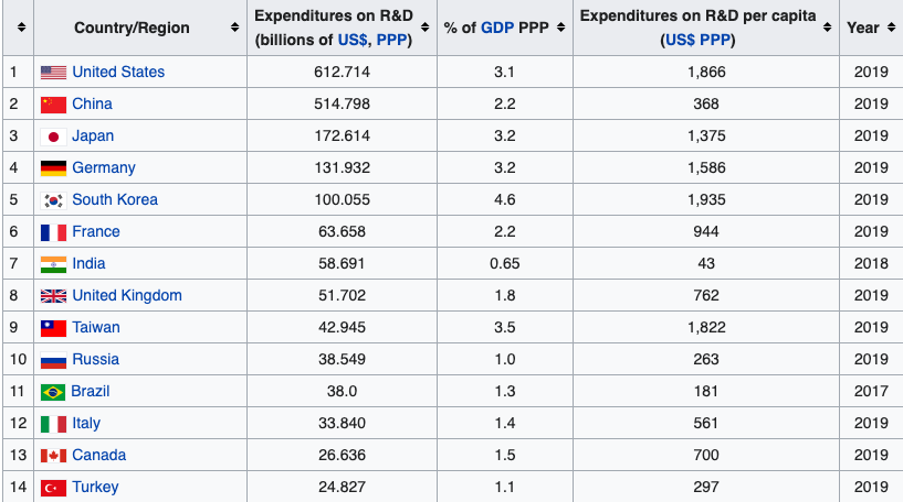East Asia has always been an appealing market for German technology firms and, with growing uncertainties in markets closer to home, has only become more attractive. German companies can no longer afford to neglect the vast opportunities China, Japan, Korea and Taiwan hold!
Here’s why German firms should look to Asia, what’s hot in terms of technology areas and how to succeed there.
Why is Asia a good fit for German tech?
Not only are China, Japan and Korea the second, third and tenth biggest global economies, they boast huge R&D budgets: all rank in the top five in terms of dollars spent.
 Countries by R&D spend. Source: OECD Data
Countries by R&D spend. Source: OECD Data
The message here is simple: East Asia is constantly looking for new technologies. And, renowned for their strength in industries including mobility, electric vehicle tech, automation and digitisation, German companies are well-placed to provide these sought-after cutting-edge solutions.
When I first moved to Korea 15 years ago, it was commonplace to hear from major Korean conglomerates that they could develop innovations in-house: “We have 10,000 engineers. We’ll do it ourselves,” one exec once told me.
Well … not anymore! With the pace of technological developments constantly accelerating, doing everything in-house is no longer feasible, and Asian tech giants have become more eager and willing to look for external solutions to keep up with the competition.
We see this with the dozens of East Asia corporations we work with which are looking for partnerships and cutting-edge innovations from Europe across a range of sectors. German firms, in particular, will find a warm welcome in Asia because their tech is highly regarded for its quality, and German business culture is considered trustworthy – trust and relationships being the key requirements for successful collaborations in Asia.
Hot techs
So, what are the tech fields in most demand in Asia which play to German strengths? I would identify three main areas.
- Energy and clean tech. Prompted by external and internal pressures, Korea, Japan and China have pledged to eliminate carbon emissions. Germany’s reputation for quality and reliability in this field means firms in Asia are ever-more likely to seek new solutions in the energy and sustainability space from the country. For example, one of our clients, Berlin-based EV tech pioneer Hubject, is making good progress in Korea and, through our Seoul team, is pro-actively growing its APAC presence.
The broader energy space is the next big thing! There’s huge development activity in Asia right now in EV battery technology and charging infrastructure, stationary energy storage and generation, grid optimisation and data.
- Digitisation and AI. Japan has the fastest-aging population globally, set to be overtaken only by … Korea. China’s one-child policy was the chief contributor to the country having way too few children, too – which means an ever-diminishing labour force in all three countries, and an ever-increasing need for automation, machine learning and robotics.
This is true for several industries including manufacturing, commerce, logistics, healthcare and data processing. Following this drive towards digitisation, for example, we recently helped German RFID leaders Elatec build their business in Japan, China and Taiwan.
- Enabling hardware and software. Many of our Asian corporate clients come to us in search of innovation that can be applied to drive radical change in their capabilities. Given how quickly software, autonomous vehicles, electronics and manufacturing are developing, Asian corporations are looking keenly towards Germany for support. One example is German firm IPlytics, which we’ve represented in Korea, Japan and China, and which has been highly successful in securing new customers and sustainable business growth in Asia.
How to succeed in Asia
So, Asian markets can be extremely attractive for German businesses. But they come with their challenges. Here are three important points to consider:
- Be patient. Asian corporations can be your most reliable and trustworthy partners, no doubt about it. But this won’t happen overnight. Korean, Japanese and Chinese businesses will typically undergo a complex – and often lengthy – process of evaluating your technology. They can be demanding customers, so the most successful overseas businesses are those that are able and willing to take the time to build trust with their Asian counterparts. They typically benefit greatly as a result, but it’s a long-term play!
-
One size does not fit all. Japan, Korea and China bear some similarities but, in most respects, are very different markets. So, the first step should always be to do your homework; that is, figure out the opportunity in each market and what actions you need to take to secure customers. You may need to adjust the way you normally do business. For example, consider offering free or low-cost PoCs, or take a longer-term view on the licensing structure to put in place.
- Act locally. Asia is 8,000 km away … so, engaging Asian companies remotely from Europe rarely works! The best results come from working with organisations with a presence in the Asian country you’re targeting – someone who can pick up the phone, get in front of people and solve problems in real time. More and more companies are applying this model – working with a local team of experts that can start right away and secure those crucial early wins to support further growth in Asia.
Pace of growth
So, the Japanese, Chinese, Korean and Taiwanese markets have been attractive and friendly to German firms for a long time. Now, with the pace of growth in energy, mobility, digitisation and related enabling technologies, there’s never been a better time for German tech innovators to build their business in Asia.
But the path can be a winding one, so make sure you work with market and sector experts to avoid the common setbacks.
To discuss opportunities for your tech business in East Asia, contact Michal at mw@intralinkgroup.com or on +48 575 720 766.